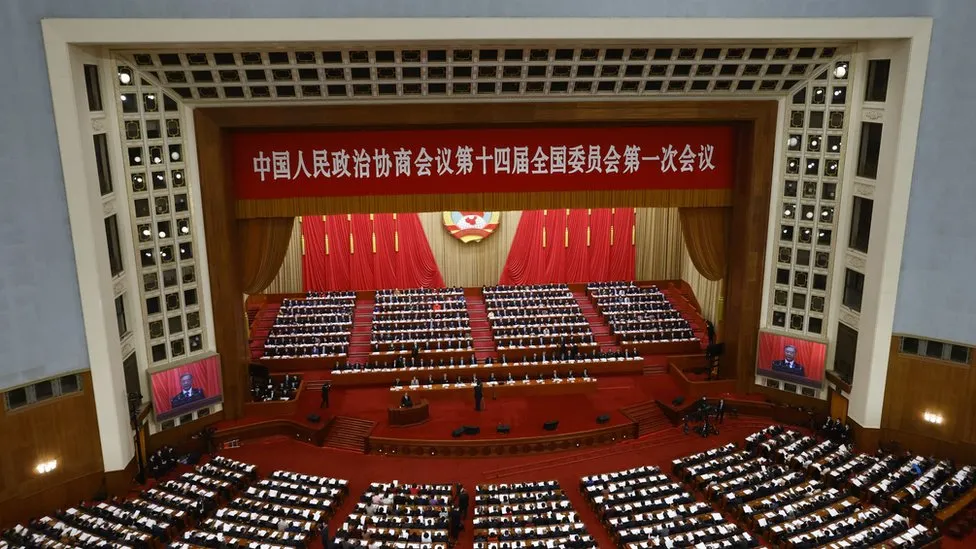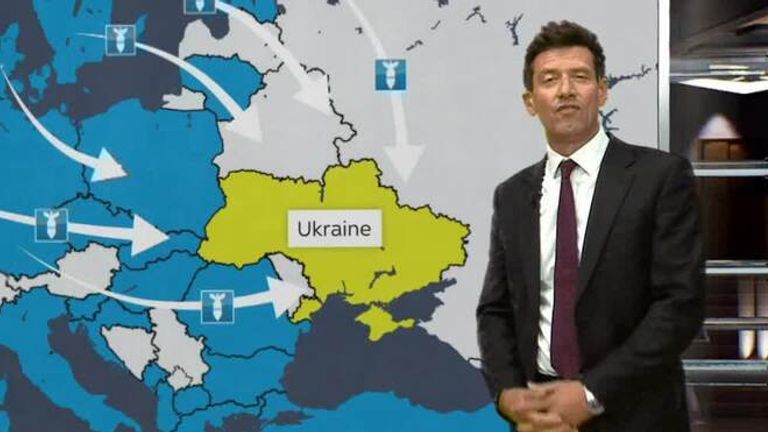Two sessions: Can a rubberstamp parliament help China's economy?
The Chinese government is under massive pressure to come up with solutions for its troubled economy.

So people will be watching the National People's Congress to see what's on offer when it starts on Tuesday.
Nearly 3,000 NPC delegates gather annually, for just over a week, inside Beijing's cavernous Great Hall of the People to pass laws, approve personnel changes and delegate the operation of government to smaller groups which meet throughout the year.
It is, for the most part, a political performance which rubber-stamps decisions already made behind closed doors.
But given that the messages delivered have been thought through by those in power, analysts will be looking out for any change in the official Party line and what it might mean for China and the world.
For example, a certain new phrase might signal a change in industrial policy or a potential new law governing investment rules.
Crucially, the lens through which to view all of this is that there is nothing more important to the Communist Party than ensuring the longevity of its rule in China. For the current leader, Xi Jinping, it is absolutely paramount in virtually all aspects of life.
This has not seemed like much of a struggle in recent decades, as business boomed and living standards improved for most, year after year.
But now Asia's engine of growth is locked in a real estate crisis which has dissolved the life savings of many families who paid for flats which were never delivered; it has armies of university graduates who can't find good jobs and it is burdened by huge amounts of local government debt, which has robbed policymakers of the ability to inject funds into infrastructure in the same way they used to be able to, whenever times were tough.
It had been the case that a new road project, or a series of bridges, could soak up a lot of unemployment, unused steel and excess concrete capacity. But this is a period of much more uncertainty.
The memes that lay bare China's youth disillusionment
Burnt out or jobless - meet China's 'full-time children'
Why should I care if Evergrande collapses?
"This year's NPC will be held at a time of unusual ferment and volatility, particularly over economic policy," says Richard McGregor, author of The Party, which examines China's structures of government.
He told the BBC that there are "rumours swirling about the government looking for a large statement of some kind to restore confidence and lift growth. There is widespread unhappiness about the state of the economy, and in turn about the direction Xi Jinping has set for the country".
In the past, when enormous changes generated great concern - like the flooding of entire historic areas to make way for the Three Gorges Dam project - there have been protest votes registered at the NPC.
But it would take an exceptionally brave Party representative to try that under Xi Jinping.
Mr McGregor said he doesn't expect denunciations of leadership during this Congress, as "all of the delegates have learnt to stay very much on message". However, he added that "even critical murmurs will be significant".
Professor Ann Lee from New York University said the session could see legislation providing more support to the private sector.
"This is a tacit recognition that China's economy needs more entrepreneurial investment in order to meet Xi's high-quality growth goals," she said.
'New productive forces'
A phrase Mr Xi has been using since the end of last year in reference to the direction of the country is "new productive forces". This is likely to be peppered through speeches in coming weeks as well.
But what does it mean?
Dr Jon Taylor from the University of Texas at San Antonio said that Mr Xi is referring to "an emphasis on the development and commercialisation of technology and science, digitisation, and high-end manufacturing centring on emerging intelligent and eco-friendly technologies".
He added that, while this is a "quite interesting catchphrase", it is going to take time for these types of industries to take off, partly because "these sectors of China's economy are relatively small", and "the problem is that China faces some serious challenges, thanks to an underperforming economy".
He said that the new emphasis on technological innovation may pay off in the long term, but that "in the short term, China remains dependent on infrastructure spending and a wobbly property market".
A property crisis and high youth unemployment serve as the backdrop of this year's Two Sessions
One interesting aspect of Mr Xi's "new productive forces" was when he told the Politburo in January that such forces would be "freed from traditional economic growth mode and productivity development paths", which would seem to suggest that the coming high-tech breakthroughs could be organised by and for the Party.
According to the former Chief Economist at multinational investment bank UBS, George Magnus, "this emphasises the party's leadership, control and power to leverage 'new productive forces' for ideological work. This, in turn, means an industrial policy that serves to strengthen the Party's dominance in the economy's core digital and scientific spaces".
Professor Lee sees the use of this phrase as important because it shows that "Xi is determined to reinvigorate the Chinese economy after setbacks from its real estate sector and the ongoing trade tensions with the West" and said that it "may signal a turning point".
Choreographed questions, mountains of jargon
This mass political gathering starts with a marathon speech from the Premier, in which he reads out the Government Work Report, which summarises - in a very formulaic fashion - how China has performed over the past 12 months over a wide range of areas: the economy, the environment, in agriculture and so on.
Then it moves on to what the Party's plan for the next year is. This is a key place to pick up any shifts in government thinking, but a magnifying glass may be required to spot it amongst the mountain of jargon.
During the NPC, there will also be a series of highly choreographed press conferences in which only screened questions are permitted and virtually all answers rehearsed.
Over recent years, the Party has also placed fake foreign correspondents into these press briefings, who seemingly represent the international media but are really from front companies based overseas but controlled by Beijing.
"The days of relatively candid press conferences from various ministries and provincial delegations on the side lines of the Congress are pretty much gone," said Mr McGregor.
This vast meeting may be an elaborate show - with loyal delegates head down in turgid reports - but that doesn't mean it will be without important developments.
According to Dr Taylor, "while the Congress tends to be a decidedly performative autocratic exercise, there are elements of policy innovation and promulgation that bubble up".
These are trying times for China, he said.
The country "faces several challenges that it will continue to struggle with this year: encouraging foreign direct investment in the midst of decoupling, systemically addressing local government debt, restoring private sector confidence, developing greater technological and scientific self-reliance, and ramping up consumer demand".
There are significant problems facing this superpower and the moment for answers is upon it.
-bbc







